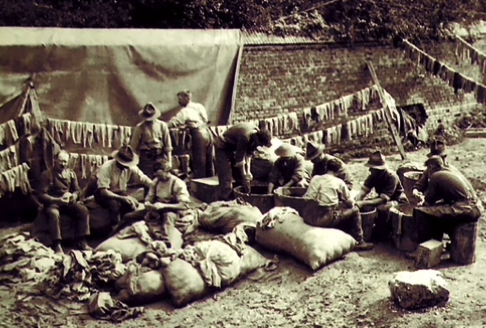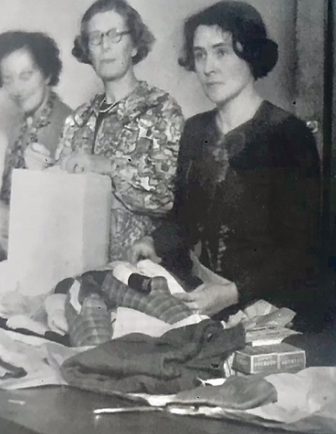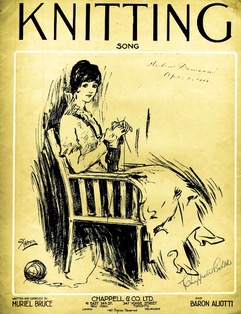|
Kiwi
songs - Maori songs - Home
Undernourished
men in cold, wet, polluted trenches got Trench Foot. Warm
clothing and regular changes into clean dry woolen socks
prevented this, so hundreds of thousands on NZ women and
children knitted all through WW1 and WW2.
Knitting
Knitting Knitting
|
| 1. Marching, marching thro' the misty night, Peering through the dark, longing for a fight, Tramping, stumbling on the broken ground, With the tang of battle all around, While at home our busy needles fly. Knitting with a smile, knitting with a sigh; For our sons and brothers, fathers, lovers, too; We're knitting for our soldiers brave and true. Chorus:
Knitting, knitting, knitting, with this khaki wool and grey, Mufflers, socks and Balaclava caps, We're knitting, day by day Knitting, knitting, knitting, with a prayer in ev'ry row. That the ones we hold in our hearts so dear may be guarded as they go 2. "Clang and clamour, smoke and dust and death, Blindly fighting on, catching every breath. Comrades dropping down on ev'ry side, Holding back the seething, hostile tide. But at home our loving hands are still Knitting with' our hearts, knitting with a will, Knitting for our Empire, king and soldiers too; We're knitting for our loved ones brave and true. Chorus:
|
The original text had "their busy needles," "for their sons" etc.
This is what those in the knitting circle sang while one of them played the piano.
Trench Foot
Our soldiers avoided this “Trench Foot” by keeping their feet clean and dry: they oiled their boots, washed their feet, and put on clean, dry, thick woolen socks as often as possible. By 1918, twenty older soldiers in the NZ Brigade’s laundry unit behind the lines were tub-washing and line-drying 4000 pairs of socks each day.

My name is Mrs McIntyre
and my husband left for
the War a few months
ago. With my husband
gone, I have had to take
on many new roles, such
as chopping and gathering fire
wood and working in the
factory.
To distract myself , I
joined the Spinsters Club. We
feel that this is our
way of helping over
there, when we cannot
physically be there ourselves,
for our husbands and for
our country.

In this photo it is 1915 and the other women and I are knitting socks for the soldiers. We try and provide them with the comforts that the soldiers need in their kit bags: two pairs each of socks and underpants, two each of woolen shirts and undershirts, towels and cholera belts, and one handkerchief, chest protector, balaclava cap, and a housewife."
But there is the spinning wheel!
And work must be doe,
the war must be won:
For home and our country's weal.
We cannot all enter the trenches,
Nor fight on a battle field:
But we can spin yarn
with wool from the farm,
The distaff and spindle wield!
CHORUS Waltz time
We are spinning, spinning, spinning:
And so busily we'll spin!
While the World's Great War we're winning,
'Til the World's Great War we win.

Jane Morison
The Four Little Stars in the Blue' (1916)
and tell others what to do.
But the boy with the mind, wont be left behind,
while his country needs him too.
So they marched away, at the break of day.
to the music of the silver band.
To fight for the right and to conquer that might,
which would ruin their native land.
Then here's to the King and his councillors,
to the Army and Navy too!
But give me the boys of that southern land,
with the four little stars in blue.
They fought in the desert, arid and bare,
they climbed cliffs rugged and high.
They had little food or shelter there,
and many brave hearts had to die.
But they left behind a noble name,
and their family is proud to recall.
The deeds of valour and deeds of fame,
true stories of heroes all.
Mrs Gardner's 700 Socks
In WW2, NZ women and school children knitted and donated more than a million wool garments, with the most expert knitters tasked with turning out 4000 woolen gloves for our airmen.
(Source, 'The Loving Stitch’ by Heather Nicholson, 1998)
Knitted in the tramcar
Knitted in the street,
Knitted by the fireside;
Knitted in the heat.
Knitted in New Zealand,
Where the Golden Kowhai grows;
Sent abroad to you, dear,
To warm your heart and toes.
Knitted by the seaside;
Knitted in the train.
Knitted in the sunshine;
Knitted in the rain.
Knitted in New Zealand,
While we sing this glad refrain:
May whoever wears them
Come safely back again.
They are some fit!
I use one for a helmet
and the other for a mitt.
Glad to hear
You're doing your bit -
But who the h***
Said you can knit?
Please do not think
I'm unwilling to go,
I have no intention of quitting.
But Phillis, there's one thing
I really must know.
For whom is that muffler you're knitting?
I don't care a lot,
if by Germans I'm shot,
but if that is for me,
I'll desert on the spot.
World War Two.
In 1943, Bing Crosby and the Andrews Sisters came out with the very popular Pistol Packin' Mama.
NZ women knitted, collected and packed more than a million woolen items to their boys at war or in prison camps overseas, and this parody quickly spread around New Zealand.
Parcel Packin' Mommas
Bring those parcels down Girls,
Bring those parcels down,
Parcel Packin' Mommas,
Bring those parcels down

Start at half-past eight, Girls
Try not be too late,
You have to beat the record,
Start at half-past eight.
Send the goods along Girls,
Please don't hesitate,
If you don't keep moving,
You will all be late.
When your bins are empty,
Call for more supplies,
There always will be plenty,
So show those men your eyes.
We don't mind you joking,
We don't mind some shocks,
So long as you keep poking
Parcels in the box.

